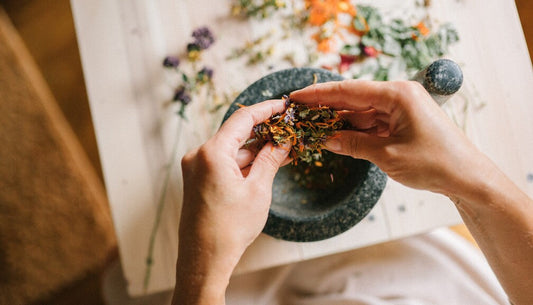Every month, Dr. Suhas will answer questions from our followers about men’s health and wellness. If you have general questions for him, please send us an email to askdrsuhas@chopra.com, and your question may be the one he answers next month.
This month, Dr. Suhas answers a follow-up question to his last Q&A around a castor oil cleanse.
Dr. Suhas: Ghee is an Ayurvedic superfood. When it is prepared on low heat it retains vitamins E and A and other antioxidants. Ghee has a higher smoke point than plain butter or other oils, which makes it an excellent cooking oil. Since it does not include the milk solids, it can also be used for those who are lactose intolerant.
The purest form of ghee does not have a dramatic effect on the HDL to LDL ratio. It will actually aid in coronary artery disease and reduce very-low-density lipoprotein (VLDL). It has, however, shown to increase triglycerides in a study performed with animals but in a small human population even this finding was inconclusive. It is safe to consume ghee in moderation for all body types in all seasons of life. This study has exposed the old paradigm that eating fat makes you fat.
Dr. Suhas: Castor oil is a great purgatory in Ayurveda because at the end of the day it is an oil. Oil-based purgative also support the pathways for liver detoxification. It has a very lubricative effect on the colon and doesn’t dry you out like most common laxatives.
For someone suffering from a severe vata imbalance and chronic constipation, we recommend a ghee and castor oil cleanse done in unison! Ghee helps to loosen things up and drain any ama (toxins) into the GI tract before the castor oil flushes them out. It often used for stubborn fat-soluble toxins to be separated from the tissues.
Discover your dosha type here.
You add more ghee to your diet (3-4 teaspoons) few days before the cleanse. On a Sunday or any day that you are not working, you can mix 2 tablespoons of castor oil with 1/2 cup of freshly squeezed orange juice and drink this at about 6:00-7:00 a.m. in the morning. You can expect 4-5 bowel movements in the next few hours.
Continue to sip plain hot water or herbal tea and follow a soupy liquid diet for the rest of the day.
It includes blended soups, broth, or soupy khichadi.
Dr. Suhas: Between 2:00-6:00 a.m. is the Vata time, and sleep becomes light naturally. It is easiest to be disturbed during these hours. Make sure you are balancing your Vata dosha with your diet, routine, and stress-management techniques. Switch to a warmer oil such as sesame or olive on the soles of your feet. Have a set bedtime routine or nighttime hygiene such as sleeping at the same time daily, winding down 45 minutes before sleep, shutting off devices, and making yourself comfortable. Keep the bedroom warm, cozy, and dark.
I don’t recommend people take melatonin or other sleep aids for a long period of time as your body will develop a dependency. It can only be used in short intervals such as travel or trauma.
Ready to take control of your health? Download the Chopra App for personalized well-being guidance you can access anywhere.
This month, Dr. Suhas answers a follow-up question to his last Q&A around a castor oil cleanse.
Question 1: Does Ghee Have Cholesterol, and Should I Be Limiting It?
Dr. Suhas: Ghee is an Ayurvedic superfood. When it is prepared on low heat it retains vitamins E and A and other antioxidants. Ghee has a higher smoke point than plain butter or other oils, which makes it an excellent cooking oil. Since it does not include the milk solids, it can also be used for those who are lactose intolerant.
The purest form of ghee does not have a dramatic effect on the HDL to LDL ratio. It will actually aid in coronary artery disease and reduce very-low-density lipoprotein (VLDL). It has, however, shown to increase triglycerides in a study performed with animals but in a small human population even this finding was inconclusive. It is safe to consume ghee in moderation for all body types in all seasons of life. This study has exposed the old paradigm that eating fat makes you fat.
Question 2: Could You Please Provide the Protocol for a Castor Oil Cleanse? How Much and How Often Should I Use It?
Dr. Suhas: Castor oil is a great purgatory in Ayurveda because at the end of the day it is an oil. Oil-based purgative also support the pathways for liver detoxification. It has a very lubricative effect on the colon and doesn’t dry you out like most common laxatives.
For someone suffering from a severe vata imbalance and chronic constipation, we recommend a ghee and castor oil cleanse done in unison! Ghee helps to loosen things up and drain any ama (toxins) into the GI tract before the castor oil flushes them out. It often used for stubborn fat-soluble toxins to be separated from the tissues.
Discover your dosha type here.
You add more ghee to your diet (3-4 teaspoons) few days before the cleanse. On a Sunday or any day that you are not working, you can mix 2 tablespoons of castor oil with 1/2 cup of freshly squeezed orange juice and drink this at about 6:00-7:00 a.m. in the morning. You can expect 4-5 bowel movements in the next few hours.
Continue to sip plain hot water or herbal tea and follow a soupy liquid diet for the rest of the day.
It includes blended soups, broth, or soupy khichadi.
Question 3: I Sleep Light and often Wake Up Around 3:00-4:00 a.m. and Feel Restless, Should I Take a Sleeping Pill?
Dr. Suhas: Between 2:00-6:00 a.m. is the Vata time, and sleep becomes light naturally. It is easiest to be disturbed during these hours. Make sure you are balancing your Vata dosha with your diet, routine, and stress-management techniques. Switch to a warmer oil such as sesame or olive on the soles of your feet. Have a set bedtime routine or nighttime hygiene such as sleeping at the same time daily, winding down 45 minutes before sleep, shutting off devices, and making yourself comfortable. Keep the bedroom warm, cozy, and dark.
I don’t recommend people take melatonin or other sleep aids for a long period of time as your body will develop a dependency. It can only be used in short intervals such as travel or trauma.
Ready to take control of your health? Download the Chopra App for personalized well-being guidance you can access anywhere.






















